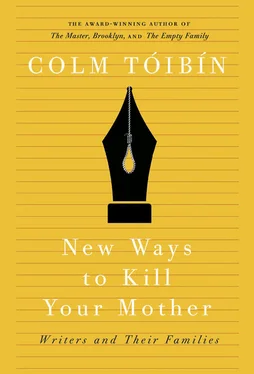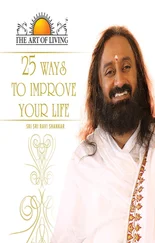And since the novel is made up not of moving characters on the stage wearing colourful costumes and knowing how to project their voices, but of grim black marks on the page, then one of the other purposes of aunts is to allow them dramatic departures or vicious arguments for the amusement of both the younger generation and the reader. The departure of Lady Catherine de Bourgh, for example, is tremendously exciting. ‘I take no leave of you, Miss Bennet. I send no compliments to your mother. You deserve no such attention. I am most seriously displeased.’ Or the departure of Mrs Glegg in The Mill on the Floss : ‘ “Well,” said Mrs Glegg, rising from her chair, “I don’t know whether you think it’s a fine thing to sit by and hear me swore at, Mr Glegg, but I’m not going to stay a minute longer in this house. You can stay behind, and come home with the gig, and I’ll walk home.”’ Or the row half a century later between Stephen’s father and his Aunt Dante on Christmas Day in James Joyce’s A Portrait of the Artist as a Young Man : ‘Dante shoved her chair violently aside and left the table, upsetting her napkinring which rolled slowly along the carpet and came to rest against the foot of an easychair. Mr Dedalus rose quickly and followed her towards the door. At the door Dante turned round violently and shouted down the room, her cheeks flushed and quivering with rage…’
Thus aunts depart in novels as aunts arrive, to break the peace and lighten the load. Of all the novelists, the one who comes most to mistrust the mother and make use of the aunt is Henry James. In his critical writings, his prefaces and his letters, James wrote very little about Jane Austen. Early on he made clear his admiration for her: ‘Miss Austen,’ he wrote, ‘in her best novels, is interesting to the last page; the tissue of her narrative is always close and firm, and though she is minute and analytical, she is never prolix or redundant.’ But he also wrote that ‘Jane Austen, with her light felicity, leaves us hardly more curious of her process, or of the experience that fed it, than the brown thrush who tells his story from the garden bough.’ He alluded sarcastically to ‘the body of publishers, editors, illustrators, producers of the present twaddle of magazines, who have found their “dear”, our dear, everyone’s dear, Jane so infinitely to their material purpose’. There are many ways of reading this, but it should be noted that James was not, in general, in the habit of praising other novelists; he saw his own work as a deeply self-conscious art, refined into a system, an exquisite tapestry. He did not notice anyone else operating at the same intensity and degree of deliberation as he did. But he took what he needed, as any novelist does, from his colleagues’ work, and unlike ‘the brown thrush who tells his story from the garden bough’, he saw no reason to let everyone know.
In his creation of aunts, in any case, thrush or no thrush, James took his bearings from Austen not only in the outlines of what she did, but in the complexity she sought and the dense pattern she managed while breaking up a family for the purposes of her fiction. Both Austen and James made fictional space in which things moved unexpectedly or changed shape, in which there was much ambiguity and duality. If they played with pattern, it was a pattern that left space for what was shimmering and dynamic. Both Austen and James placed at the very centre of their pattern a throbbing consciousness, a striving presence who could filter experience, on whom experience could press in ways that were unpredictable, and fascinating for the reader.
In James’s six greatest works there is an absent mother who is replaced by a real aunt or by a set of surrogate aunts. In Washington Square , for example, Dr Sloper’s wife has died, leaving Catherine, his daughter, motherless. Her helper and confidante becomes her aunt, who is conspiratorial, mischievous, oddly kind and somewhat foolish, and always on the verge of being banished by Dr Sloper. In The Portrait of a Lady Isabel Archer is also motherless, indeed her father is dead too, and she is found as an unprotected orphan in Albany by her aunt Mrs Touchett, who is eccentric, wilful, bossy, interesting, both kind and brittle. Mrs Touchett takes over Isabel’s life, takes her to England and Italy, introduces her to a new world of possibility; the aunt is effectively the agent who causes the action of the novel to take place.
This idea of James killing off mothers and replacing them with aunts could be easily misunderstood. He was close to his own mother, as he was also to his Aunt Kate, who lived with the family for most of James’s upbringing, and travelled with them when they crossed and recrossed the Atlantic. But he also sought to get away from his mother, and managed to do so by settling in Europe. He was devoted to his mother and he arranged not to see her much, thus making the devotion all the more heartfelt as time went on. He wrote to her and about her with considerable filial tenderness. His response to her death was one of genuine shock and grief.
His connection to his mother, both close and tenuous, may be one of the reasons why he sought to erase so many mothers from his best work. It was an area that he did not want to explore; it was complicated and raw, too complicated and raw to be easily shaped into narrative. And his replacing her with aunts or surrogate aunts may have had something to do with the constant presence of his own Aunt Kate in the household, and we may be led to this view because James tended to use the hidden or secret shape of his own life, of his own fears, and find metaphors for them in his fiction. Thus killing off your mother and replacing her with your aunt might have satisfied some hungry need James had, which he kept locked in a cupboard in the house of fiction to be produced on special occasions.
But this is too crude a reading, just as it is too easy to explore Jane Austen’s own life as an aunt, or her need to assert herself in her fiction as someone who had no mother worth speaking about, and offer these as reasons why she did not have mothers in her last three books. There is another way of reading James’s motives or reasons for sending mothers into eternity while his characters lived in finite time. It simply suited the shape of the story he was trying to tell; it was impelled by the novel rather than the novelist. In other words, it was a technical problem that the novel had, rather than a psychological problem of his own that James needed to address. In his fiction, he needed mothers to be absent because having them present would undermine his entire enterprise. The main protagonists of his best books enact a drama of self-reliance, self-invention; they live alone and unnurtured in their minds. James could make their aunts silly, foolish, capricious and eccentric, and thus make their arrival and departure interesting and delicious for the reader, but he could not bring himself to create a very foolish or indolent mother as Austen had done in Pride and Prejudice and Mansfield Park . This was not because he didn’t have the heart or the urge — he did, after all, create bad and capricious mothers in works such as What Maisie Knew and The Spoils of Poynton — but because such an approach would not be subtle, would be too easily comic, would destroy the level of moral seriousness that he sought to conjure up in how he displayed his characters and let them respond to each other.
Dr Sloper’s loss of his wife and second child in Washington Square is seen not only as personal but as professional. ‘For a man whose trade was to keep people alive, he had certainly done poorly in his own family,’ James writes. When Catherine, his only living child, is ten, Dr Sloper ‘invited his sister, Mrs Penniman, to come and stay with him’. Mrs Penniman, whose first name is Lavinia, ‘had married a poor clergyman, of a sickly constitution and a flowery style of eloquence, and then, at the age of thirty-three, had been left a widow, without children, without fortune — with nothing but the memory of Mr Penniman’s flowers of speech, a certain vague aroma of which hovered about her own conversation’. She is interested in melodrama and romance, she is a schemer, she has, James writes, ‘a taste for light literature, and a certain foolish indirectness and obliquity of character. She was romantic, she was sentimental, she had a passion for little secrets and mysteries.’
Читать дальше












